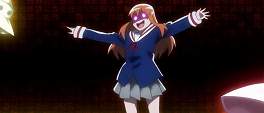You might notice from the phenomenal opening to Mikakunin de Shinkoukei (Engaged to the Unidentified) that it isn’t until the final few seconds when the floppy-haired, dour looking male shows up. He’s the titular “unidentified” of the series and for the most part, he remains as such. The series may as well have been called “The Increasingly Peculiar Adventures of Mashiro” because the diminutive, screechy voiced child is undoubtedly the star of the show. The storyline could have been easily retooled to remove the stoic male Hakuya completely and otherwise still retain a lot of Mikakunin’s charm.
The second meaning of “unidentified” in the title concerns a mid-season plot twist that comes from so far off the map it’s initially difficult to know what to make of it. It serves its purpose of injecting some dynamism into the story and gifts the series with a much needed quirk because lord knows the premise of a boy (and his little sister) turning up and claiming he’s betrothed to the otherwise oblivious girl wasn’t going to win any awards for originality. Up until the plot twist the rhythm of the show is by-the-numbers; the question being whether the augmentation supplies enough life to keep the series afloat.
For the most part yes; this is a romantic light comedy through and through and on a long enough timeline it’s easy enough to see how the peach-haired Kobeni and previously mentioned dispassionate Hakuya could end up together. It’s not like there’s any competition really with the cast tipped well in favour of the XX chromosome so it seems more a battle of attrition than a genuine flourishing romance. That’s ignoring their history together of course which involves the double-whammy standbys of “I saved your life” and “childhood friend” to smooth over the whole engagement part.
The spine of the show is undoubtedly in the light humour which visits a familiar stable time and again, primarily hinging on Mashiro and her status as not only a young child, a country hick in a modern city but also in the crosshairs of Benio, Kobeni’s sibling with a raging sister fetish. Nothing is new here and anyone who has seen even a handful of anime series will understand how little this advances or otherwise champions the campus love comedy genre. Even the introduction of another developmentally stunted teen (this one blonde to Mashiro’s brunette) does nothing to the formula, instead bogging it down by adding another exasperated and needy voice to the mix.
What the series does having going for it beyond its wonderful toe-tapping opening tune and the lustrous hair of each of its cast is an unrelenting pleasantness. Not usually a compliment for a series but love comedies are tricky to strike the right balance with, often opting for painfully zany, needlessly raucous or otherwise disturbingly lascivious in an attempt to stand out. Like its male protagonist and Kobeni living in the shadow of her sister, Mikakunin shuns attention and seems content to proceed without causing a fuss. It’s pleasing because even though Hakuya is about as interesting as a sack of rocks, his complete lack of male friends means the expected lewd jibes are nowhere to be found, even the very infrequent cracks about Kobeni’s “child bearing hips” are light years away from what could be present.
That homely familiarity does begin to stifle Kobeni as a character though who is too often railroaded onto the “perfect wife” track, a lot like Ai Yori Aoshi’s Aoi is initially painted as but, like Aoi, Kobeni does begin to grow out of this towards the tail end of the series taking more control of events rather than remaining largely passive to the turn her life has taken. Her demeanour does at least mean we get frequent insights into her thought process, making her one of the most developed and the least one note member of the cast. At twelve episodes the series is about as long as its individual elements can support it with Mashiro and Benio’s antics wearing thin shortly before the finale which, for better or worse, sloshes all of the cast’s signature traits into a short space of time.
You could do worse than Mikakunin for spending your time. That’s obviously not a resounding endorsement but if you’re looking for an amusing and inoffensive time filler then Mikakunin could be for you. It does nothing extraordinary or daring but it does it with a congenial competence that is hard to fault but just as hard to praise.








Mikakunin was one of my favourite shows in its season (along with Zvezda and Hoozuki no Reitetsu).